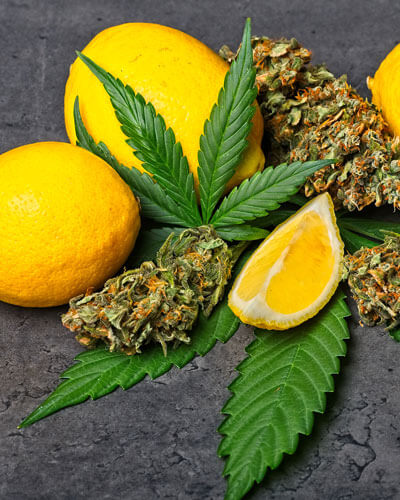Terpenes are chemical substances that occur naturally in plants and some animals. They are in charge of the flavors, scents, and even colors associated with different species of vegetation. Terpenes distinguish certain cannabis strains from others in terms of taste and smell.
They can also be converted into useful goods such as cleaning solvents, insecticides, and dyes. Some have even been shown to have medicinal effects.
While nearly all plants contain terpenes, the following are some of the more prevalent sources of terpenes citrus fruits and cannabis-fragrant herbs like sage and thyme.
What exactly do they do?
Terpenes are supposed to protect plants from predators and the elements. What they do to people is still a bit of a mystery. On the other hand, Terpenes are increasingly being looked at by cannabis researchers and users.
As research continues, the focus is on whether terpenes are why some plants have a more substantial THC effect than others.
Do they give you a high?
Terpenes will not get you high in the classic sense. Nonetheless, some are deemed psychoactive because they affect the brain. While terpenes are not psychoactive on their own, some believe they may influence the effects of THC. However, further research is needed to confirm this theory.
Many cannabis budtenders and enthusiasts believe that customers place far too much focus on THC levels when selecting a strain. Instead, they advise concentrating on specific terpene profiles to achieve the desired results. Research has found that certain terpenes may have potential benefits for some mental health issues such as bipolar disorder, depression, and anxiety.
Terpenes in Common Use and Their Effects
There are over 400 identified terpenes in cannabis, but only a few have been connected to specific effects by scientists.
Here are a few examples of common terpenes and their potential effects:
- Myrcene, which is found in mangoes, has antifungal and antibacterial activities and may have sedative characteristics.
- Linalool Lovers of lavender as aromatherapy may wish to look for cannabis-containing linalool, which may aid in stress relief.
- One of the most commonly detected terpenes, Limonene, has characteristic citrus overtones and may have anti-cancer capabilities. It has been demonstrated to have anti-anxiety benefits in mice.
- Humulene This terpene can be found in ginseng, which has long been utilized in traditional medicine for its stimulating properties.
- Beta-pinene If you’ve ever walked through a coniferous forest, you’re familiar with the fragrance of beta-pinene, which may have both anti-depressant and anti-cancer characteristics.
- Beta-caryophyllene Beta-caryophyllene, which is found in hops, rosemary, and cloves, may be helpful in treating anxiety and depression symptoms.
Keep in mind that much terpene research is still in its early phases. More high-quality human research is needed to thoroughly understand the health effects of various terpene compositions.
Maximizing Their Advantages
Interested in learning more about terpenes? Here are some pointers to remember:
Maintain a journal. Take note of your intake strategy and how you feel as you experiment with different terpene profiles. This can help you narrow down the ideal terpene profile for the benefits you’re looking for over time.
Examine the label. Some lab-tested cannabis brands contain terpene profiles and product concentrations.
Examine the product for freshness. Terpene levels may decline over time, so look for items with a recent package date. If you’re going to go with flower, at the very least give it a whiff. You want something fragrant (high terpene content) and not stale.
Turn off the heat. There is some indication that dabbing, which includes extreme heat, may destroy synthetic terpenes, producing possibly toxic metabolites. You may want to stick to vaporizing flowers at a low temperature or taking edibles until experts learn more about how heat affects terpenes.
What are terpenes?
About CBD Health Solutions
We believe in quality CBD products, our manufacturing facility holds the following certifications. Every step from plant to the final product is important – our hemp is grown in the USA and each farmer uses our seeds, our extraction process uses CO2 to remove the CBD oil from the plant and then formulated into the final product. Each step is done with the highest attention to quality to produce the cleanest and most effective CBD product.



